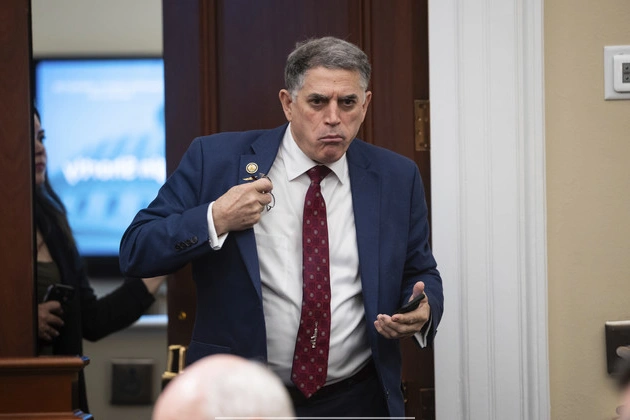
Pet policy measures stuffed into President Donald Trump’s “big, beautiful bill” by House Republicans are now at risk of getting jettisoned by the Senate.
From Planned Parenthood to gun silencers to expedited energy permits, Speaker Mike Johnson and committee chairs tucked various provisions into the recently passed megabill to secure votes — and deliver some elusive GOP wins.
The Byrd Rule Challenge
But several are considered likely to run afoul of strict Senate rules governing reconciliation — the budget process Republicans are using to skirt a Democratic filibuster. Under what’s known as the Byrd rule, “extraneous” measures that have only a negligible impact on the budget, or none at all, have to go.
Key Areas of Concern
The most consequential item subject to Byrd review is the GOP’s proposal to use a controversial accounting tactic to essentially zero out the cost of extending Trump’s 2017 tax cuts.
Republicans temporarily sidestepped getting a formal blessing of the “current policy baseline” method from MacDonough as part of the budget resolution debate earlier this year, but Senate GOP staff have met with her several times this year on how to try to craft the megabill, two people with knowledge of the discussions said.
Other tax provisions are also at risk, though Senate Finance Chair Mike Crapo (R-Idaho) has worked with House Ways and Means Chair Jason Smith (R-Mo.) to fine-tune some of the House text in anticipation of Byrd challenges.
The House megabill includes a 10-year ban on states enforcing regulations on artificial intelligence. While there has been no official budgetary score for the provision, Senate Commerce Chair Ted Cruz (R-Texas) has acknowledged the provision will be challenged for a Byrd violation.
During a marathon House Energy and Commerce Committee markup earlier this month, panel staff called the provision a “policy change,” which could be detrimental to Republicans’ case that it can be included under Senate rules.
GOP aides argue it’s necessary to carry out a $500 million upgrade of technology at the Commerce Department but Sen. Kevin Cramer (R-N.D.) said it didn’t seem to pass the budget-impact smell test. “That sounds awfully policy-centric in my mind,” he said.
Senate Democrats are planning to challenge House language that would place limits on the federal courts’ ability to enforce contempt citations. House Republicans have argued the language is aimed at frivolous lawsuits, but Democrats and some legal scholars view it as an attempt to rein in the courts’ ability to hold the Trump administration accountable.
Some House Republicans have also vowed to try to get the Senate to remove the language, with Rep. Mike Flood (R-Neb.) telling constituents at a town hall this week that he wasn’t aware the provision was in the bill.
House Republicans made a major change to the way gun silencers are regulated as part of an eleventh-hour effort to win over Rep. Andrew Clyde (R-Ga.). They had already agreed to eliminate a $200 transfer tax on gun silencers in an initial draft of the bill. The final version, however, went much further — also ending the $200 tax on the manufacture of gun silencers and removing them from the regulatory purview of the National Firearms Act, which involves mandatory registration and other strictures.
While Republicans are confident the tax eliminations will survive in the Senate, there was internal debate over whether the deregulatory provision would ultimately fall under Byrd, according to one person granted anonymity to disclose private deliberations.
Senate Agriculture Chair John Boozman (R-Ark.) has privately warned that the House’s agriculture package — which includes $60 billion in programs typically included in the farm bill — could face Byrd-related complications.
Boozman supports including “risk management” policies for farmers — like bolstering crop insurance, which make up the most expensive parts of the farm bill. But he and other Senate Republicans are skeptical that some other programs — dealing with biosecurity, trade promotion, research and more — will comply with Byrd.
The decision has big implications for ag policy: If those pieces are stripped out, it could become difficult, if not impossible, for lawmakers to pass a “skinny” farm bill later this year.
MacDonough ruled in 2017 that language aimed at defunding Planned Parenthood did not comply with Byrd amid Republicans’ bid to repeal the Affordable Care Act. Now, the GOP is making a similar effort, with the House including language broadly barring Planned Parenthood from receiving federal funding.
The parliamentarian isn’t the only threat here: Several centrist Republicans in both the House and Senate oppose targeting the organization, which provides other health care services in addition to abortion.
House Republicans moved to streamline permitting for fossil fuel projects in their version of the megabill, but — as they have long acknowledged — Senate budget rules are likely to come into play. In 2022, for instance, Democrats omitted energy permitting provisions sought by then-Democratic Sen. Joe Manchin from the reconciliation package that became the Inflation Reduction Act, in part due to Byrd concerns.
But Republicans say the narrower measures they included that raise money by charging fees to developers to expedite their permits could skirt Byrd scrutiny. They’ve already dropped several pipeline permitting provisions and softened language to advance the controversial Ambler Road project in Alaska.











